Oral History no.4
“Views from Ocean Avenue: Leslie Cannon’s 60 years in Ocean Grove”
Listen to her story.
In this interview, Leslie Canon reflects on her life in Ocean Grove after first visiting in 1961, when she met her future husband George and his family, who owned the Llewellyn Hotel and operated the Main Avenue Sandwich Shop. She describes moving permanently to Ocean Grove in 1963, living at 16 Ocean Avenue for 60 years, and raising her three children there despite the challenges of having few year-round neighbors. Leslie recalls helping with the family businesses, teaching in local schools, and adapting to the town’s strict rules, such as no cars or beach use on Sundays. She shares memories of early traditions, like changing into bathing suits only in bathhouses, and the gradual shifts as Ocean Grove evolved from a quiet, restrictive community into a more affluent and diverse town. Although saddened to leave the home where her children and grandchildren built cherished memories, Leslie reflects warmly on her life in Ocean Grove, the friendships formed, and the strong sense of community she experienced.
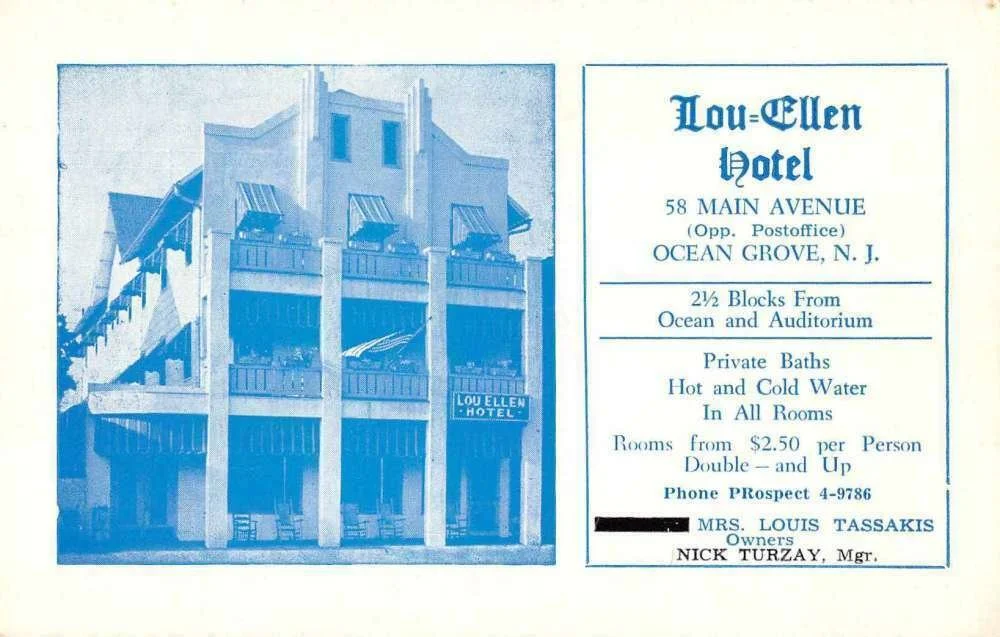

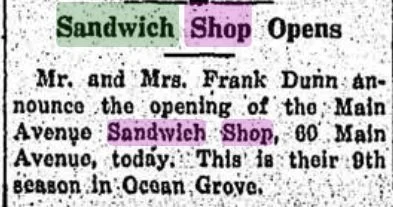

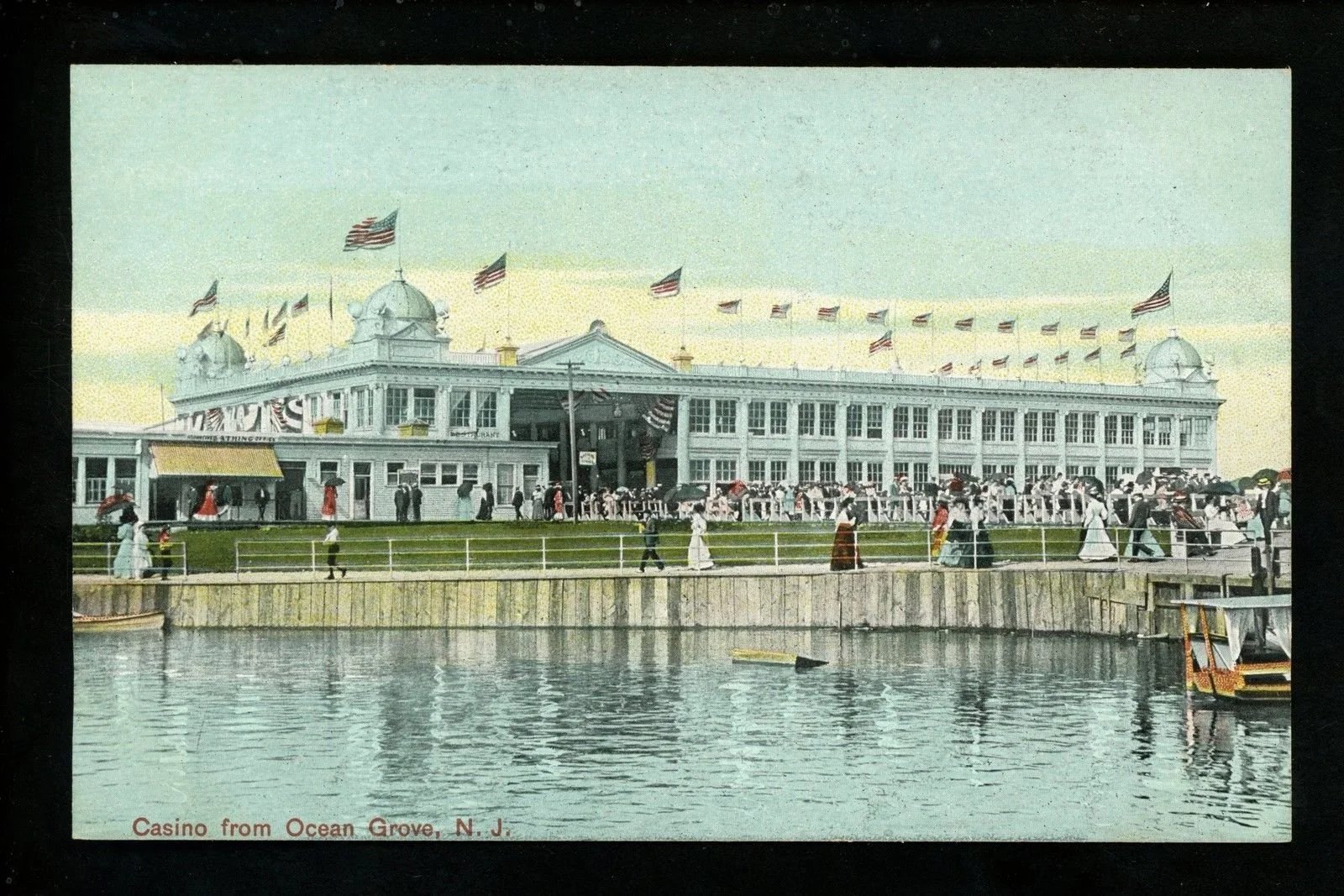
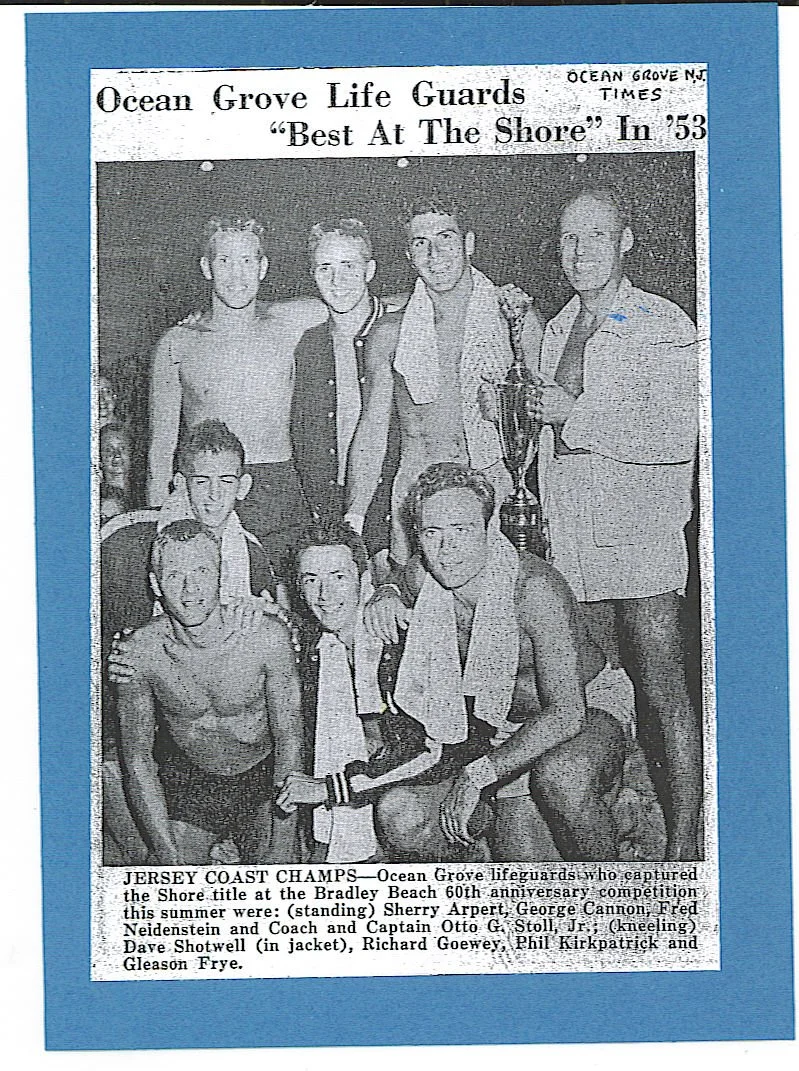

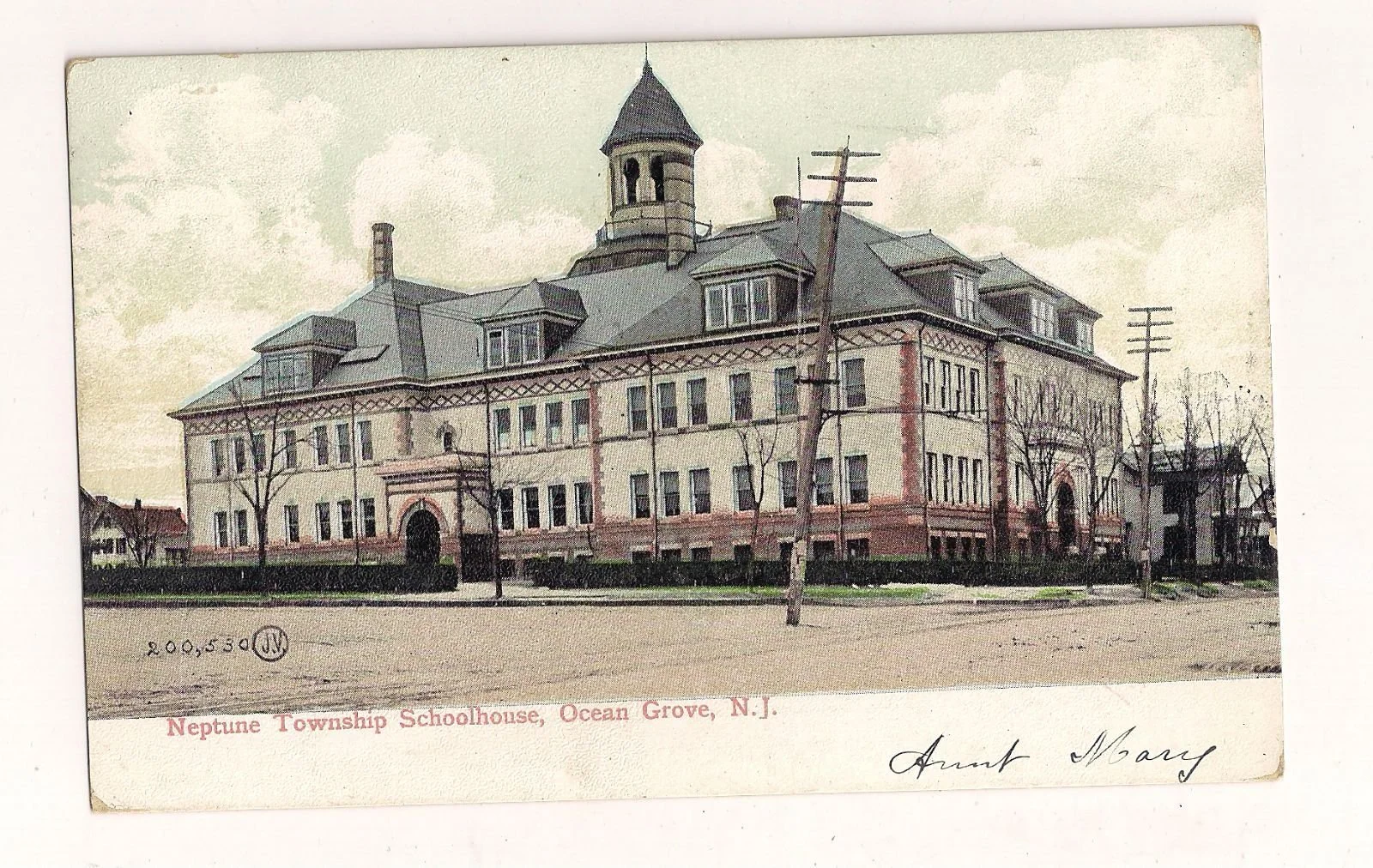
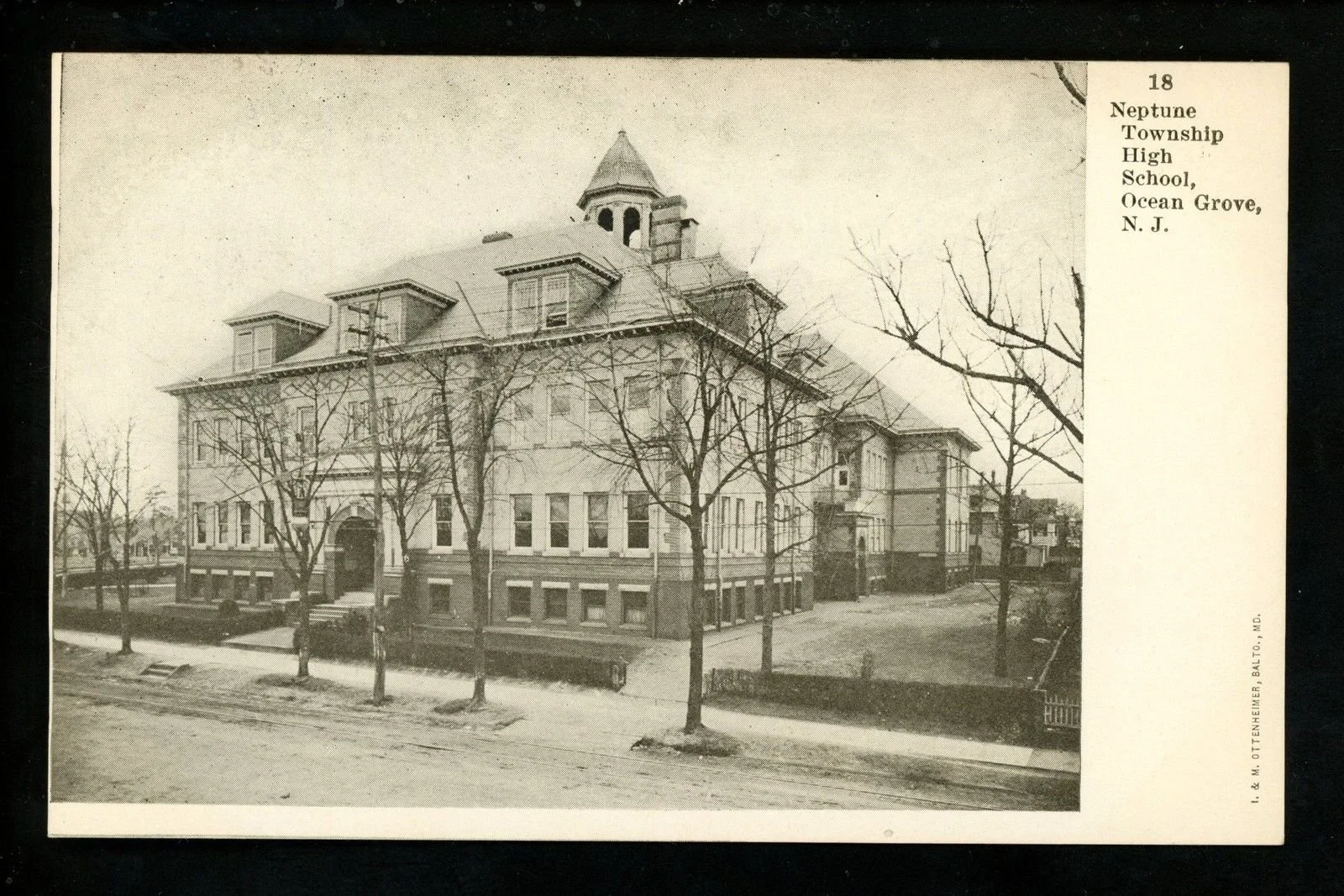

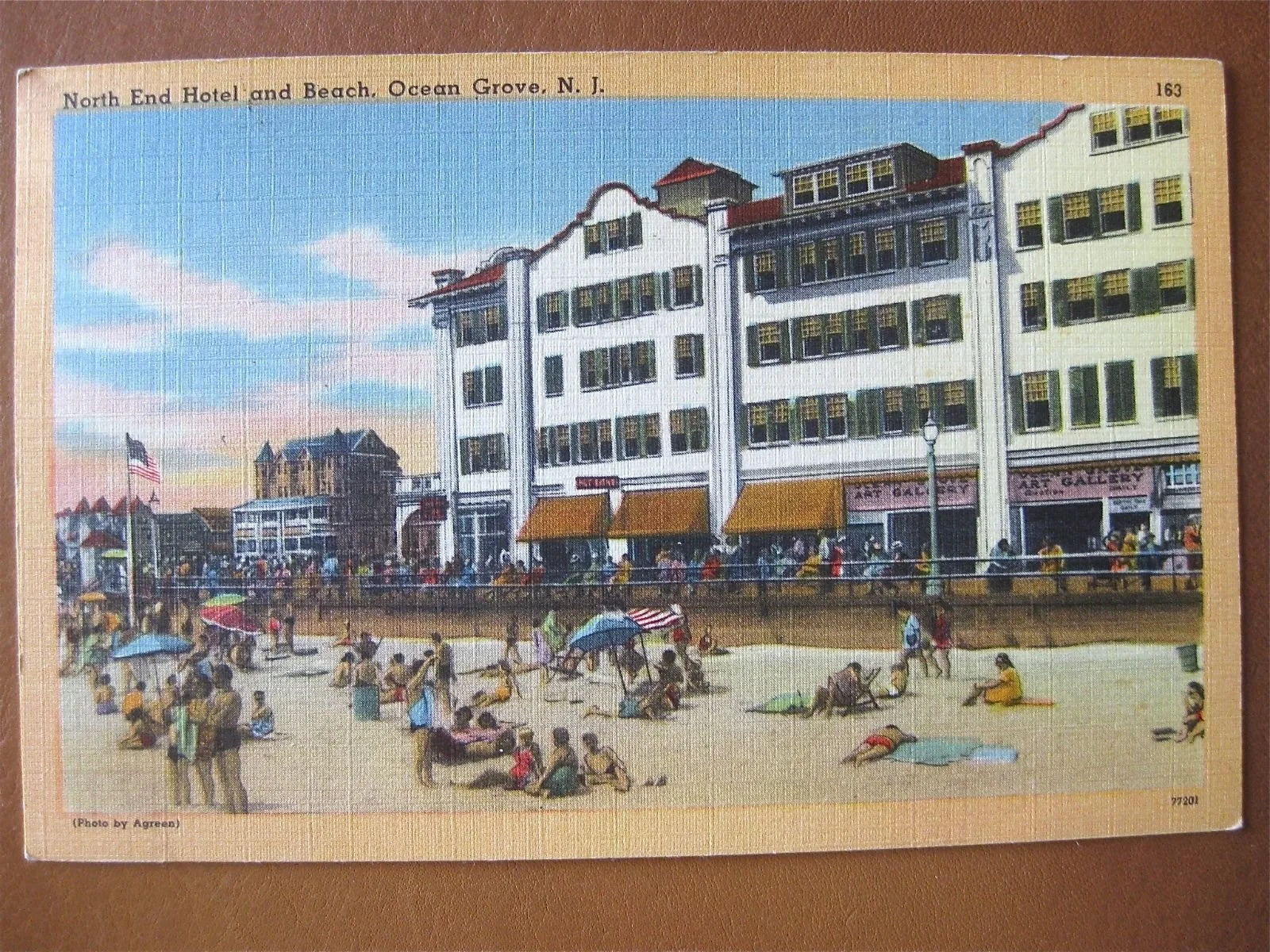
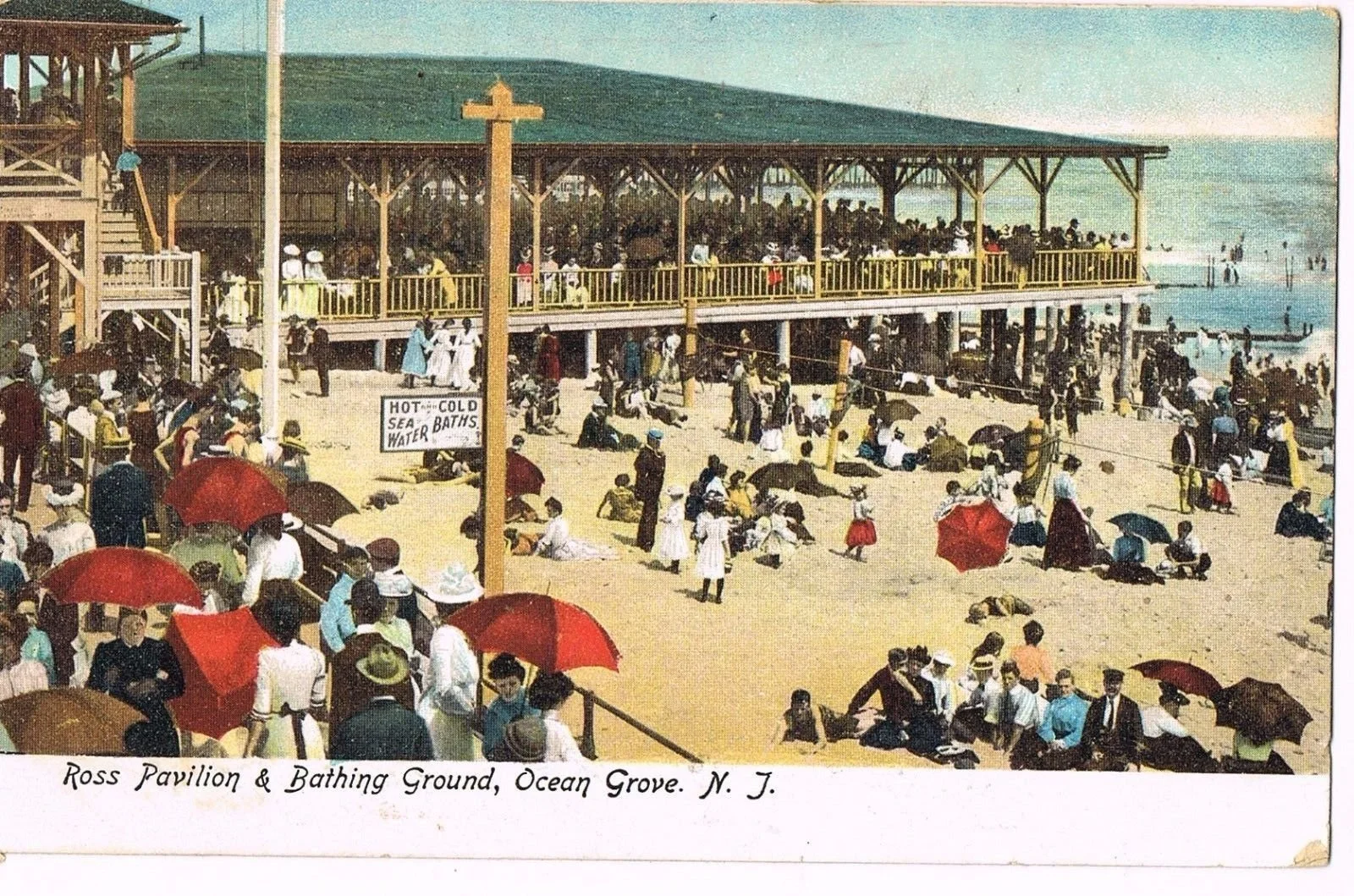

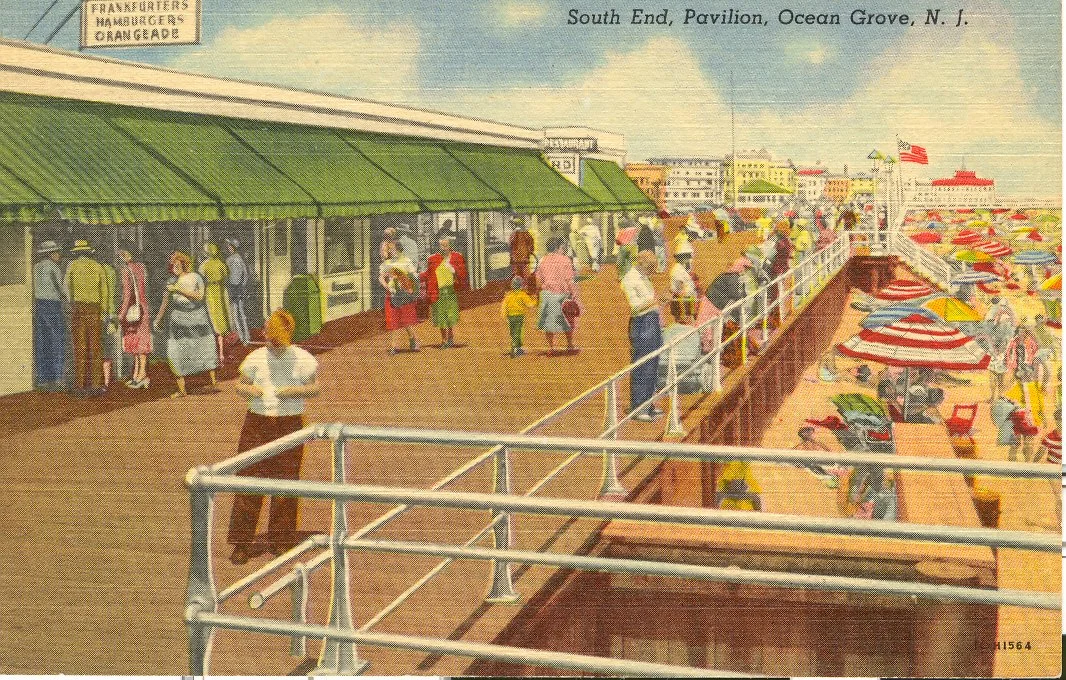
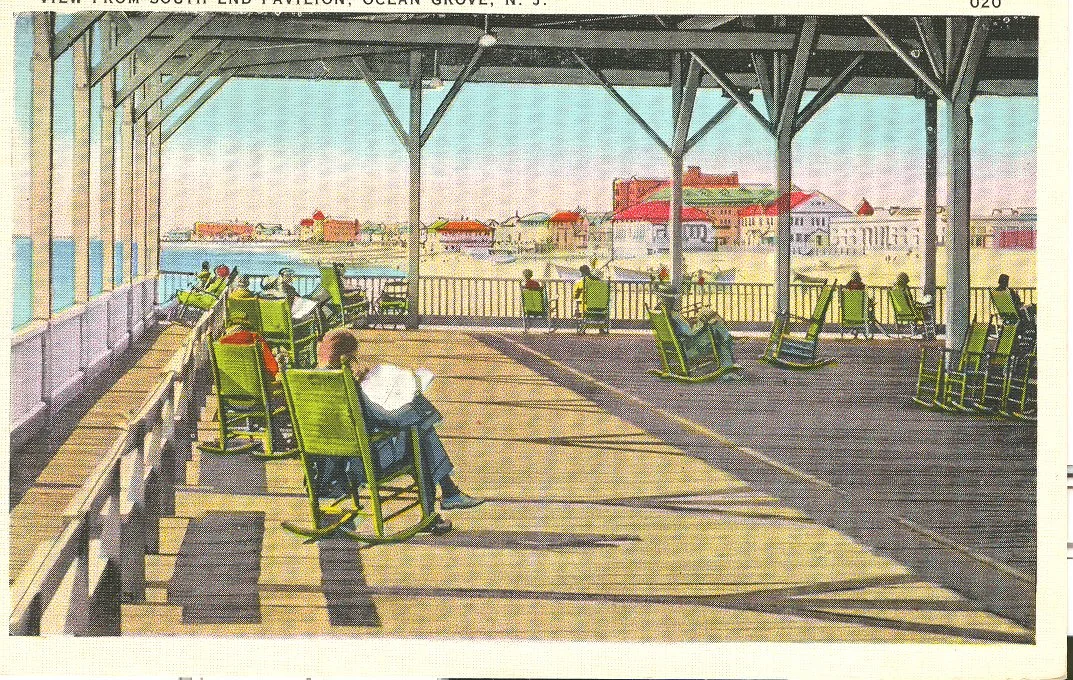
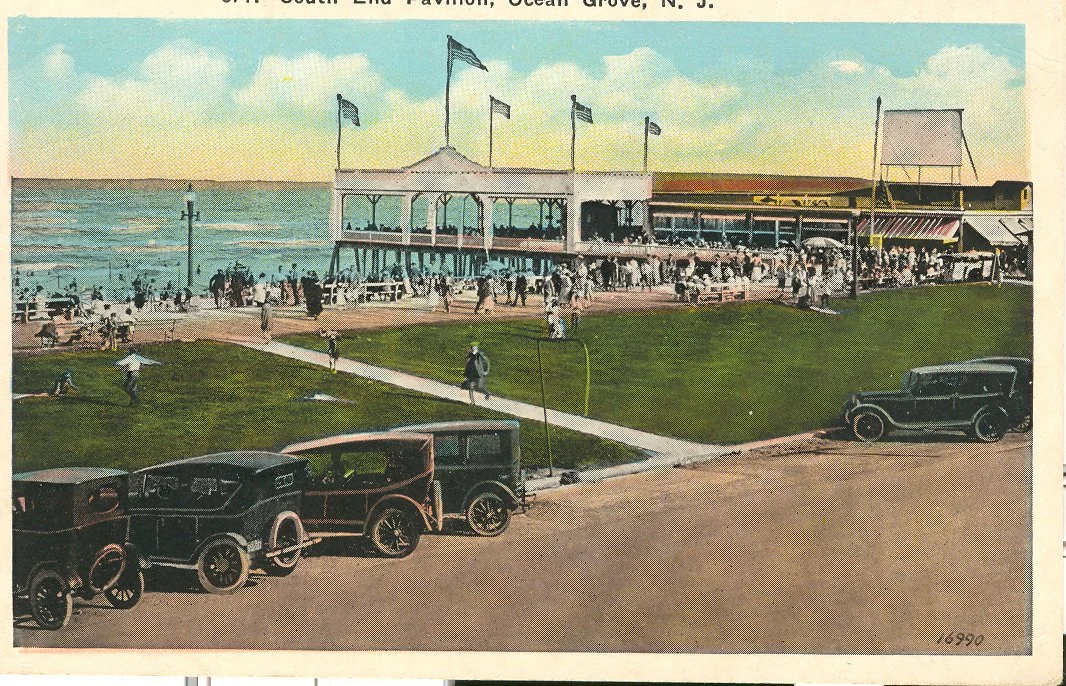
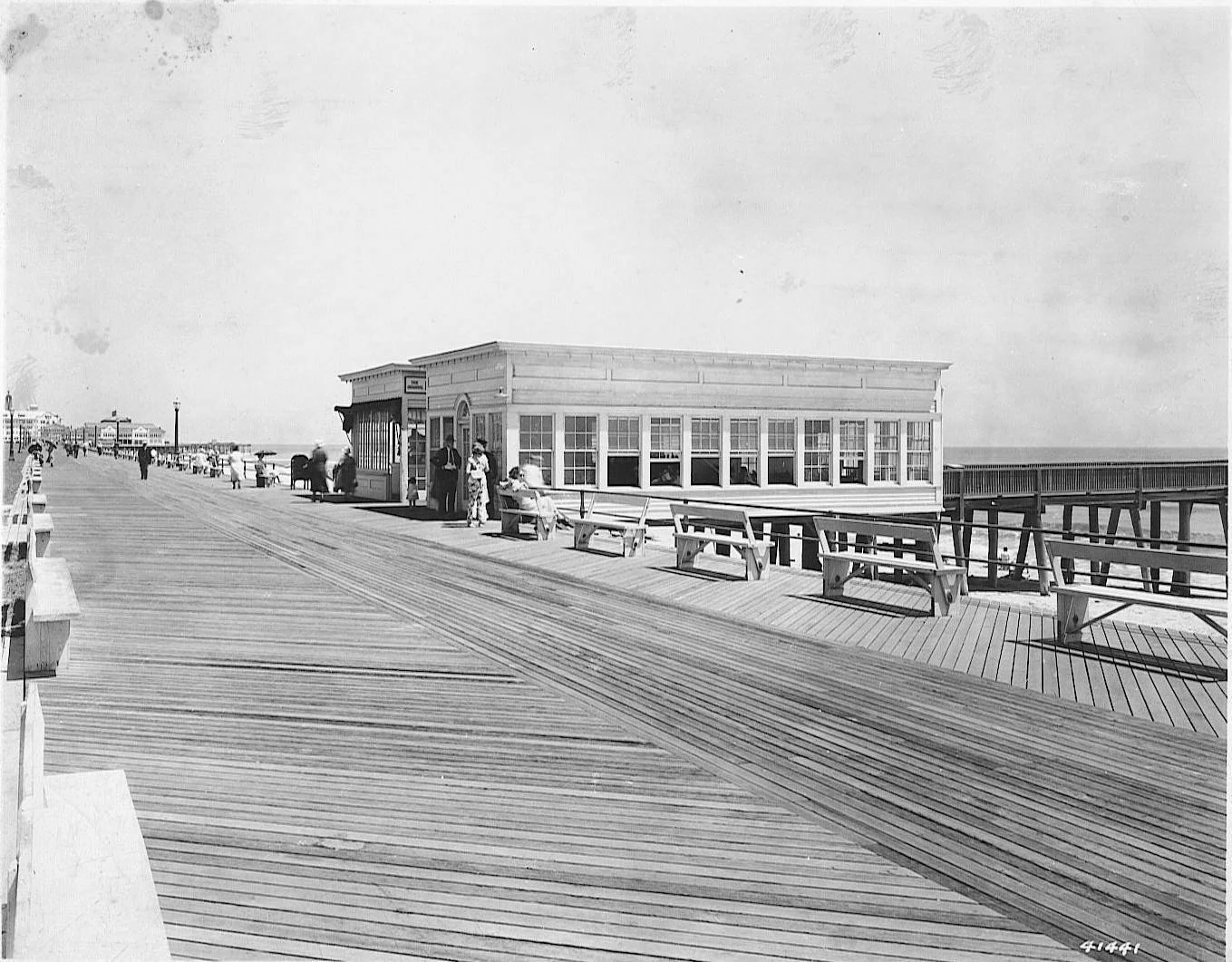



Melinda: Today is Friday, August, April 19th, 2024, and I am Melinda Allen-Grote, and I am meeting with Leslie Canon at her home in Tinton Falls to discuss her relationship and history to Ocean Grove. Thank you so much, Leslie, for agreeing to be part of this project.
Leslie Cannon: You're welcome. I came to Ocean Grove the first time in the summer of 1961. I had grown up in Ohio and was going to college in Ohio, and my husband was there finishing up his degree. And I was a freshman, we met, and he graduated at the end of that first year in 1961. So I got in the car with him, and we drove to Ocean Grove, and I met his mother and his sister and family, and stayed and visited for about a week. And then I went back home and then continued to correspond with him [her husband]. And the next summer, I came back to Ocean Grove and waitressed at the hotel. Not at the hotel, but his father had died before I met him. And his mother and he were running a little sandwich shop on Main Avenue. It's in the location of... I'm trying to think what the store is now in there. It was... And he [her husband] had bought 56 Main Avenue that couple of years, I guess, in '61.
Melinda: Your husband's father?
Leslie: My husband himself.
Melinda: And what was your husband's name?
Leslie: George. [M: Okay]. Because it was a hotel. It was called the Lou Ellen Hotel. And he was working on converting it into apartments. And he was still working on that and lifeguarding in the summer as well. And his mother was running the sandwich shop. And the sandwich shop I think there's a little... It used to be where... Well, never mind.
Melinda: I'll go back to- What was the name of the sandwich shop?
Leslie: George. It was the Main Avenue Sandwich Shop. Okay. And hamburgers, my daughter still has a sign from the, not from the sandwich shop, actually, but in the Lou Ellen Hotel had been a drug store. And so there was this little cafe in there as well. She still has a sign of the hamburgers 35 cents. In fact, I put it on a picture on Facebook a few years ago because one of the items featured was It was an usher's Sunday. I had to ask all these people throughout the years because then my husband and ot married in 3, and I We lived in Ocean Grove. I lived in Ocean Grove from then on. And everybody I asked all his friends in the fire company, nobody knew. And then somebody answered me on Facebook and didn't know what the Usher Special was, what Sundae was.
Melinda: And what was it, your name?
Leslie: Well, it was obviously, I guess it was a Sunday with a vanilla ice cream with the sauce, maybe chocolate sauce, but the ushers had to dress with a coat and tie, and then they had a carnation. So there was a carnation on top of it on Sunday.
Melinda: I love it.
Leslie: That was the story that they told me.
Melinda: So what was it like coming from Ohio to Ocean Grove and settling here?
Leslie: It was very different. I was used to Beach because I had family that lived in Florida, and so we had gone to Florida. And so I knew the ocean, and that was comfortable. It was difficult in that Ocean Grove really had very few winter residents, and we lived on Ocean Avenue, so we had no neighbors.
Melinda: Where on Ocean Avenue?
Leslie:16, in the same house. I moved in. His mother was living there. And so we lived in. It was a large house, and we lived there with her. And they were renting the third floor at the time. It had a separate entrance. And we had tenants up on the third floor who I don't think I ever met the man. He was there for many, many years. He'd lived there. But we had no neighbors in the winter and in the months. And then on the opposite corner was the Shaman Hotel. So in the summer, there were people there. And next door on the other side of us on Ocean Avenue, on the north side, was an elderly couple, and their daughter and her son lived there for a while. So it was just desolate. Now, I had lived out in the country in Ohio, so that part... But I did have neighbors, and it was a big difference.
Melinda: What was that like for you? What? What was it like for you?
Leslie: Well, What was it like for me? I just was happy with my marriage, happy to be in a beautiful location. I found it... I was I had always been involved in a lot of things that I didn't get involved in. I was not a church person. I was not interested in joining the Methodist Church, which at the time concerned my husband, in that he felt I would not meet people, but I did, and slowly. But I was teaching, and so we had our lives, and we-
Melinda: Where were you teaching?
Leslie: I was teaching... I taught one year at Manasquan. We both taught there, and then circumstances changed, and we moved and taught at Neptune a couple of years. Then I went up. We were both working on our master's degrees, and at night, we were traveling. So my husband was busy. And with continuing with the apartments and in the summer, it was ready. We started renting out apartments just for the summer [at the Lou Ellen Hotel location]. It was meant to be a year round, but it It was easier to get an income out of it to rent for the summer. So we did that for a couple of years. And I was very active in the summer, renting, helping with that, helping get the apartments cleaned. We would put curtains in and try to make it. But we were renting it just, I think, one year for the summer. And then from then on, we started running it year-round. And so I had little time to go to the beach because I was helping with the restaurant as well, and waitressing, mostly.
Melinda: This was.. waitressing at the Sandwich Shop?
Leslie: Yes, it's at Sandwich Shop. Yeah. There was nothing. And the Llewellyn, and then he made the... Where the drug store, Benny, opened all up. And that first floor, there was a little store. Actually, he made it into a little ice cream store on the east side. And downstairs was an office. The surveyor's office is still there now. But at the time, he opened that, made that office for a sister who was a pediatrician and her husband. And they were building a house in Spring Lake. So They lived in the upstairs, one of the apartments upstairs.
Melinda: And where was the Lou Ellen?
Leslie: It's 56 Main Avenue. 54 56 Main Avenue. Okay. And as I said, I got pictures and stuff if you want to see. And it's now still there. So big columns in front. It had for some years a barber shop in the front after the doctor’s office. They moved into their home and moved into an office there. But summers, I can remember every year there would be a group of kids who come along around doing a scavenger hunt, and I guess a couple of different youth groups were involved with that. This first summer, I can remember wearing my keeping my winter coat out and wearing it all every night. If we went out on the boardwalk, it was so cold to me with the ocean breeze. We thought we would... We had the windows open all the time. We always had the front door open. That was always an experience because somebody would walk in and think it was a hotel and ask for rooms. We had the door open.
Melinda: But So 1961 was very different than 2024.
Leslie: Very different. There were no cars on Sunday. There was no traffic. In fact, this is after '61. This is '63. Or actually, this became maybe our first child was born in '69. And I think it was after when he was maybe five years old. So the change by then, let's say in the '70s still, early '70s. We had friends drive in from Ohio, and they stayed with us. [Takes a phone call] So, no cars on Sunday in the street. So we had to take our car out. We had a garage, fortunately, but most of the time, the garage was filled with junk. Hard to say because it was a two-car garage. We had two cars. George's mother had a car, so one car was in the garage. The other car, we usually parked in Bradley Beach Saturday night and walked in, as did everybody. I can remember a couple of nights we had friends for dinner, and they were late, and the police would come and politely knock on the door and ask us to please move the car if It was after midnight. But so as I was saying, when our friends from Ohio came, and curiously enough, they arrived just as my son's birthday party was ending, and all the parents were coming to pick up their kids, and they were saying, You have to go out. There's a whale out there. Now, for us, that was the first time I had ever... Any of us, even my husband had seen a whale. The whales didn't come by, or we didn't see them like now. Things have changed in that respect a lot. And our friends from Ohio thought this is something that happens every day. It doesn't. They stayed over the weekend. They stayed with us three or four days, at least. My husband was, I guess, I don't know where he was, but I took them down to the beach for a walk, and we got pulled off the beach by the police. As was the Ocean Grove had their own police force and told that we couldn't walk on the beach at all on Sunday. That was the first I had heard of that. I knew you couldn't go swimming, but it wasn't a particularly nice swimming day, as I remember. But we just went for a walk. And you couldn't go swimming any time Sunday. It wasn't just the afternoons. So- And you couldn't walk on the beach. We were told we could not walk on the beach, we had to leave. So when George came home, I told him about that. So he knew the Chief of Police and all because he had lived there. They had bought their house in 1952, but they had come all the summers as he was growing up from the time he was two years old. Every summer, they [The Chief of Police's family] had rented a place, and eventually his aunt bought a house, and they stayed with her or somewhere else. He talked about that she would rent so many rooms that he ended up having to sleep under the kitchen sink when he was a little kid because after the war, there were so many people that wanted to just get out and come down for a night or so. It was no air conditioning anywhere. So to stay at the beach, people would sleep on their porches, upstairs porches a lot.
Melinda:
What was your husband's history in Ocean Grove? They started coming when he was...
Leslie: When he was a toddler, he has his stories that he was lost, two years old, and his mother said he was lost. He said he just went for a walk, and they were all out on the boardwalk, and he just... you know, a big family group. Her sisters had come, and I don't know when they started coming, as I said, I know that she as a young woman, I started to tell you that, had come down with her older sister and ran a hotel. Well in Asbury for one summer, just started a career because they were not educated past ninth grade, these girls.
Melinda: And this is what year?
Leslie: Well, they were born in In 1898 or so, 1899. They were Irish twins, very close together in years.
Melinda: So they started coming in the '20s, in the early '20s?
Leslie: Yes, for sure. And we go to the Casino at the end of Ocean Grove. That was a big place to go to come for dancing and whatnot. And Everybody has the postcards, pictures of people in their formal dress. They're very, very fancy dress. Now, when I first came to Ocean Grove, there was a dress code in that you did not wear your bathing suit out to the beach. You wore your street clothes, and you could only go to the beach, get onto the beach through bathhouses, one at the south end and one at the north end. The bath house at the north end is well known because the remits to the old pool were there, and that's where the bathhouses were. At the south end, there was a concession stand. It was actually also like, and Avon has that big place where people can sit out on the boardwalk. There was one of those out on the boardwalk at the south end of Ocean Grove also, which was destroyed by a hurricane. And also the concession stand and everything went. And when that happened, then the bathhouses were washed out. And how you got... So when you got to the bath house, you had a little locker, which was basically the size of a closet that you could rent out, change into your bathing suit, and leave your clothes in the locker, take your couple of towels and things. So most people left their towels and any beach equipment. Nobody was using hooking boards [boogie boards) then. They didn't allow any of that on the beach. Then you would go and walk under the boardwalk through a tunnel. You were not seen on the boardwalk in your bathing suit. It was not allowed. So you went through in the tunnel out onto the beach. So it was very odd to me, of course, but that's what it is. And then there was definitely a crowd. You were either a Southender or a Northender. And of course, we lived in the center. It didn't matter to me, but my husband had always gone to the South, and it was a little closer. So that was where I ended up going and taking the kids. But back to the story about being taken off the beach, my husband called the police chief, and who was-
Melinda:
This is when you were walking on the beach?
Leslie: Yes, the walking on the beach and asked to leave by the police. And his name was Lake, and I had his last name, and I don't know his first name, but somebody recently put up a little plaque back for a memorial to him by the auditorium, I think. So he called and said, I don't think there's... My wife and our friends were taken, told to get off the beach. And the chief said, "yes, that's a law". George said, "where is that law?" And he said, "I was just looking at it. I'll find it. I'll tell you. And he looked and he couldn't find it:. So he said, "I'll call you back". So at that time, maybe it wasn't in writing for the police because he never could find it. But then, of course, they continued to have that. And then eventually, things change, and I don't remember. But my kids did grow up. They were allowed to play out on the street, which was a big delight, of course. And off-season, they didn't ride bikes on the street. That was not allowed either, even on Sunday.
Melinda:
Even during the week?
Leslie: On Sunday, [but] during the week, no.
Melinda: No bike riding?
Leslie: During the week, yeah. During the week, it would. But I'm saying Sunday, the streets were closed.
Melinda: No playing, no bike riding.
Leslie: No bike riding. I mean, my kids did play with a wagon in the street, but for the most part, no. So you sat on your porch or you did other things.
Melinda: So even during the summer, you couldn't drive in Ocean Grove. So it must have been really quiet on Sundays.
Leslie: It was extremely quiet. Yeah, extremely quiet.
Melinda: Kind of nice in a way.
Leslie: It was very nice. It was very nice and pleasant. And we, of course, ended up... We were people that like to travel and see things. So in '70, we bought a trailer and spent a lot of the summer going out West and came back. Then, of course, we couldn't park the trailer on the street. You couldn't bring that. Still, you can't do that, something like that. We had to find a place to rent to park it. If we were going to go away for the weekend, we could drive it in and pack things in and then drive out. But it was definitely an adventure.
Melinda: How many children do you have? We have three. Okay. And they all grew up in that house on Ocean Avenue?
Leslie: Yes. They all grew up and had I bought it was a wonderful way to grow up, of course. But for the youngest, there were no friends. Basically, I tell everybody I had to import friends because I had to find people, his friends from school, and any mothers I knew had the kids come over and play or make playdates. Now people today do that, don't find that It was not at all unusual. But then it was... Most kids, everybody had neighbors, but we didn't have any neighbors. They were all summer houses for the most part. We did have one neighbor, but no children.
Melinda: So that's what they They grew up knowing.
Leslie: Yes, that's what they grew up knowing. Right. Yeah. And then I can remember there was my youngest son. When he was little, he would say, "I wish I had more friends". I said, "Honey, you have a lot of friends. Little girl across the street". We did have some more neighbors by then. And he said, "But she's a girl". So the neighbors were still very few children, people with kids living in, at least in our area. There were more people in town, but not that many.
Melinda: And did 16 Ocean remain a single family house?
Leslie: Well, it was not a single family house. As I told you, it was- It was an apartment. It had apartment. And it also had an apartment in the back. Now, I mentioned that we had a two car garage. Originally, that house did not have a garage. And The back part of the house, well, I'm saying originally, when my husband's family bought it, it ended at... The house ended before the garage, and there's a little section with a back porch next to the garage that they added on. They added that on because, as I said, his sister was a doctor. So she had her physician's office and had to put a garage on so that she could keep her car in there on Sunday. She was allowed to take the car out on Sunday and to go to the hospital if needed, and the police would escort her out. That was done on Sunday. So by the time I moved in, then she had moved out of that. So they were renting That's a little section that was her office because it was actually connected internally to our house. But we could close doors and lock it off, and it had a bathroom and a little kitchen in there. So it was actually had the main house. The third floor was rented separately, and that back Dr. Cannon's original office was rented as a tiny studio apartment. So no, it was never when we lived there, one family house.
Melinda: And how long did you live there?
Leslie: I lived there 60 years. From 1963, when we got married and I moved permanently until January of this year. It's 23.
Melinda: Oh, my goodness.
Leslie: Yeah, there were very few people who could say they lived in the same house in the same place for their entire adult life.
Melinda: That's amazing. Yeah. So you saw lots of transitions in your 60 years. Oh, yes. What was the biggest one, looking back, was there something that stands out?
Leslie:Well, I'll tell you truthfully, the town was somewhat depressed at the time when I moved there, downtown, it wasn't as cute and as many shops as it is now. I do think, this sounds that the changing what my husband did to change that hotel, which was pretty sleazy because in the winter there wasn't any rent on it. It was just.. it right down in the center of town changed the tenor of the town a lot in that respect. And opening up some more stores helped. But things were... And people, down the street was on Olin Street, this nice side street, houses that were rented for the winter rentals and summer rentals. Now, people with children would rent in one of those houses and send their kids to the Ocean Grove School for a year or two. And then they had to leave in the summer. Where did they go? They didn't come back. It wasn't always the same people. We have a year of a few kids in the neighborhood, and then another year. The big changes are that it became more affluent. Of course, during and after COVID, that's really changed dramatically. But people used to have little cottages and rent them out and rent them for the winter, maybe. But the houses all have gotten fixed up better. It's a more, a different, basically different kind of town and different people that lived there. And, of course, having the changes of after the not driving on Sunday, after that got contested and changed, then at some point, I don't know when it changed, because originally to buy a house in Ocean Grove, you had to be interviewed by somebody from the association and church. It was pretty well known that it was only a Christians that were allowed. And so that eventually had to be ignored. And not that that made any difference at all in who was living or renting. But I think the Camp Meeting Association is well aware of the difference that's made in that people are not necessarily their loyalties or not to Ocean Grove and to leaving their inheritance, if they have any, to some, to the camp meeting, which used to frequently done. And the people that are living there now don't really care. And we all know that from all the lawsuits that are going on.
Melinda: So your children must have very fond memories. Oh, they do.
Leslie: They do.
Melinda: And your grandchildren?
Leslie: My grandchildren love coming to the beach and love coming to the house. And they miss that. We'll miss that. This will be the first summer that they couldn't sit on grandma's porch.
Melinda: How's that feeling to you?
Leslie: Oh, extremely sad. Yeah. I can't talk about it.
Melinda: Okay. Any other anecdotal thing? We have about three minutes left that you might want to add. A little piece of, a little nugget about Ocean Grove.
Leslie: Well, this is not a nugget, but as I complained about not having neighbors and at the time, every summer, the people that were staying at the Shaman Hotel were almost repeat customers. People came every summer. So I'd have people years go by and say, How are your children? We used to watch them play, or we didn't grow up. It was always kind and generous, nice people that we had living there. It's been a lot of good volunteerism through the town. Those are always good things.
Melinda:
Thank you. You're welcome. So very, very much.
